

Speech on Creativity
Creativity, the spark that lights up your mind with new ideas, is a magical process. It’s your unique way of expressing thoughts and emotions.
You might find creativity in painting a picture, writing a story, or even solving a tricky math problem. It’s your special touch that makes something ordinary, extraordinary.
1-minute Speech on Creativity
Good day to everyone! Today, I want to talk about something magical, something we all have within us – Creativity.
Now, let’s think about creativity as a seed. Just like a seed needs water, sunlight, and good soil to grow into a beautiful plant, our creativity also needs nurturing. We need to feed it with new experiences, ideas, and knowledge. We need to give it room to grow, to make mistakes, and to learn.
Often, people say, “I’m not creative.” But that’s not true. Everyone is creative in their own way. You might be creative in how you solve math problems, or how you tell a story, or even how you arrange your room. Creativity is not a special gift only a few people have. It’s a part of all of us.
Thank you for listening. Let’s go out there and let our creative kites fly high!
2-minute Speech on Creativity
Good day, everyone! Today, I want to talk about a magical thing called creativity. Creativity is like a colorful bird that can fly high in the sky. It is the ability to think of new and exciting ideas. It’s what makes our world vibrant, full of surprises, and interesting.
Firstly, let’s think of creativity as a seed. Just like a seed needs water, sunlight, and good soil to grow into a beautiful plant, creativity also needs some things to bloom. It needs curiosity, the desire to learn, and the courage to try new things. So, if you want to be creative, start by being curious. Ask questions, read books, explore your surroundings. Be brave and try new things, even if they seem difficult at first.
Secondly, creativity is not just about art or music. It’s like a rainbow that has many colors. It can be found in every field, from science to cooking, from sports to writing. A scientist can be creative when they discover a new planet. A cook can be creative when they invent a new recipe. A footballer can be creative when they come up with a new trick. So, no matter what you love to do, always remember, you can be creative in your own way.
Thirdly, creativity is like a muscle. The more you use it, the stronger it gets. So, don’t be afraid to make mistakes. In fact, mistakes are your friends. They help you learn and grow. If your painting doesn’t turn out the way you wanted, don’t worry. Try again. Each time you try, your creativity muscle becomes stronger.
In conclusion, creativity is a magical bird that can take you to places you’ve never been before. It’s a seed that needs care, a rainbow with many colors, a muscle that needs exercise, and a treasure hidden inside you. So, be curious, be brave, make mistakes, and let your imagination fly. Remember, the world is a canvas, and you are the artist. Paint it with your creativity and make it a masterpiece. Thank you!
Leave a Reply Cancel reply

.
, , .
, , .
“Do Schools Kill Creativity?”
This speech was originally delivered by Ken Robinson at TED2016. 1
Speech Transcript
Good morning. How are you?
It’s been great, hasn’t it? I’ve been blown away by the whole thing. In fact, I’m leaving.
There have been three themes running through the conference which are relevant to what I want to talk about. One is the extraordinary evidence of human creativity in all of the presentations that we’ve had and in all of the people here. Just the variety of it and the range of it. The second is that it’s put us in a place where we have no idea what’s going to happen, in terms of the future. No idea how this may play out.
I have an interest in education. Actually, what I find is everybody has an interest in education. Don’t you? I find this very interesting. If you’re at a dinner party, and you say you work in education — Actually, you’re not often at dinner parties, frankly.
If you work in education, you’re not asked.
And you’re never asked back, curiously. That’s strange to me. But if you are, and you say to somebody, you know, they say, “What do you do?” and you say you work in education, you can see the blood run from their face. They’re like, “Oh my God,” you know,
“Why me?”
“My one night out all week.”
But if you ask about their education, they pin you to the wall. Because it’s one of those things that goes deep with people, am I right? Like religion, and money and other things. So I have a big interest in education, and I think we all do. We have a huge vested interest in it, partly because it’s education that’s meant to take us into this future that we can’t grasp. If you think of it, children starting school this year will be retiring in 2065. Nobody has a clue, despite all the expertise that’s been on parade for the past four days, what the world will look like in five years’ time. And yet we’re meant to be educating them for it. So the unpredictability, I think, is extraordinary.
And the third part of this is that we’ve all agreed, nonetheless, on the really extraordinary capacities that children have — their capacities for innovation. I mean, Sirena last night was a marvel, wasn’t she? Just seeing what she could do. And she’s exceptional, but I think she’s not, so to speak, exceptional in the whole of childhood. What you have there is a person of extraordinary dedication who found a talent. And my contention is, all kids have tremendous talents. And we squander them, pretty ruthlessly.
So I want to talk about education and I want to talk about creativity. My contention is that creativity now is as important in education as literacy, and we should treat it with the same status.
(Applause) Thank you.
That was it, by the way. Thank you very much.
So, 15 minutes left.
Well, I was born… no.
I heard a great story recently — I love telling it — of a little girl who was in a drawing lesson. She was six, and she was at the back, drawing, and the teacher said this girl hardly ever paid attention, and in this drawing lesson, she did. The teacher was fascinated. She went over to her, and she said, “What are you drawing?” And the girl said, “I’m drawing a picture of God.” And the teacher said, “But nobody knows what God looks like.” And the girl said, “They will, in a minute.”
When my son was four in England — Actually, he was four everywhere, to be honest.
If we’re being strict about it, wherever he went, he was four that year. He was in the Nativity play. Do you remember the story?
No, it was big, it was a big story. Mel Gibson did the sequel, you may have seen it.
“Nativity II.” But James got the part of Joseph, which we were thrilled about. We considered this to be one of the lead parts. We had the place crammed full of agents in T-shirts: “James Robinson IS Joseph!” (Laughter) He didn’t have to speak, but you know the bit where the three kings come in? They come in bearing gifts, gold, frankincense and myrrh. This really happened. We were sitting there and I think they just went out of sequence, because we talked to the little boy afterward and we said, “You OK with that?” And he said, “Yeah, why? Was that wrong?” They just switched. The three boys came in, four-year-olds with tea towels on their heads, and they put these boxes down, and the first boy said, “I bring you gold.” And the second boy said, “I bring you myrrh.” And the third boy said, “Frank sent this.”
What these things have in common is that kids will take a chance. If they don’t know, they’ll have a go. Am I right? They’re not frightened of being wrong. I don’t mean to say that being wrong is the same thing as being creative. What we do know is, if you’re not prepared to be wrong, you’ll never come up with anything original — if you’re not prepared to be wrong. And by the time they get to be adults, most kids have lost that capacity. They have become frightened of being wrong. And we run our companies like this. We stigmatize mistakes. And we’re now running national education systems where mistakes are the worst thing you can make. And the result is that we are educating people out of their creative capacities.
Picasso once said this, he said that all children are born artists. The problem is to remain an artist as we grow up. I believe this passionately, that we don’t grow into creativity, we grow out of it. Or rather, we get educated out of it. So why is this?
I lived in Stratford-on-Avon until about five years ago. In fact, we moved from Stratford to Los Angeles. So you can imagine what a seamless transition that was.
Actually, we lived in a place called Snitterfield, just outside Stratford, which is where Shakespeare’s father was born. Are you struck by a new thought? I was. You don’t think of Shakespeare having a father, do you? Do you? Because you don’t think of Shakespeare being a child, do you? Shakespeare being seven? I never thought of it. I mean, he was seven at some point. He was in somebody’s English class, wasn’t he?
How annoying would that be?
“Must try harder.”
Being sent to bed by his dad, you know, to Shakespeare, “Go to bed, now! And put the pencil down.”
“And stop speaking like that.”
“It’s confusing everybody.”
Anyway, we moved from Stratford to Los Angeles, and I just want to say a word about the transition. My son didn’t want to come. I’ve got two kids; he’s 21 now, my daughter’s 16. He didn’t want to come to Los Angeles. He loved it, but he had a girlfriend in England. This was the love of his life, Sarah. He’d known her for a month.
Mind you, they’d had their fourth anniversary, because it’s a long time when you’re 16. He was really upset on the plane, he said, “I’ll never find another girl like Sarah.” And we were rather pleased about that, frankly —
Because she was the main reason we were leaving the country.
But something strikes you when you move to America and travel around the world: Every education system on Earth has the same hierarchy of subjects. Every one. Doesn’t matter where you go. You’d think it would be otherwise, but it isn’t. At the top are mathematics and languages, then the humanities, and at the bottom are the arts. Everywhere on Earth. And in pretty much every system too, there’s a hierarchy within the arts. Art and music are normally given a higher status in schools than drama and dance. There isn’t an education system on the planet that teaches dance everyday to children the way we teach them mathematics. Why? Why not? I think this is rather important. I think math is very important, but so is dance. Children dance all the time if they’re allowed to, we all do. We all have bodies, don’t we? Did I miss a meeting?
Truthfully, what happens is, as children grow up, we start to educate them progressively from the waist up. And then we focus on their heads. And slightly to one side.
If you were to visit education, as an alien, and say “What’s it for, public education?” I think you’d have to conclude, if you look at the output, who really succeeds by this, who does everything that they should, who gets all the brownie points, who are the winners — I think you’d have to conclude the whole purpose of public education throughout the world is to produce university professors. Isn’t it? They’re the people who come out the top. And I used to be one, so there.
And I like university professors, but you know, we shouldn’t hold them up as the high-water mark of all human achievement. They’re just a form of life, another form of life. But they’re rather curious, and I say this out of affection for them. There’s something curious about professors in my experience — not all of them, but typically, they live in their heads. They live up there, and slightly to one side. They’re disembodied, you know, in a kind of literal way. They look upon their body as a form of transport for their heads.
Don’t they? It’s a way of getting their head to meetings.
If you want real evidence of out-of-body experiences, get yourself along to a residential conference of senior academics, and pop into the discotheque on the final night.
And there, you will see it. Grown men and women writhing uncontrollably, off the beat.
Waiting until it ends so they can go home and write a paper about it.
Our education system is predicated on the idea of academic ability. And there’s a reason. Around the world, there were no public systems of education, really, before the 19th century. They all came into being to meet the needs of industrialism. So the hierarchy is rooted on two ideas.
Number one, that the most useful subjects for work are at the top. So you were probably steered benignly away from things at school when you were a kid, things you liked, on the grounds that you would never get a job doing that. Is that right? Don’t do music, you’re not going to be a musician; don’t do art, you won’t be an artist. Benign advice — now, profoundly mistaken. The whole world is engulfed in a revolution.
And the second is academic ability, which has really come to dominate our view of intelligence, because the universities designed the system in their image. If you think of it, the whole system of public education around the world is a protracted process of university entrance. And the consequence is that many highly-talented, brilliant, creative people think they’re not, because the thing they were good at at school wasn’t valued, or was actually stigmatized. And I think we can’t afford to go on that way.
In the next 30 years, according to UNESCO, more people worldwide will be graduating through education than since the beginning of history. More people, and it’s the combination of all the things we’ve talked about — technology and its transformation effect on work, and demography and the huge explosion in population.
Suddenly, degrees aren’t worth anything. Isn’t that true? When I was a student, if you had a degree, you had a job. If you didn’t have a job, it’s because you didn’t want one. And I didn’t want one, frankly. (Laughter) But now kids with degrees are often heading home to carry on playing video games, because you need an MA where the previous job required a BA, and now you need a PhD for the other. It’s a process of academic inflation. And it indicates the whole structure of education is shifting beneath our feet. We need to radically rethink our view of intelligence.
We know three things about intelligence. One, it’s diverse. We think about the world in all the ways that we experience it. We think visually, we think in sound, we think kinesthetically. We think in abstract terms, we think in movement. Secondly, intelligence is dynamic. If you look at the interactions of a human brain, as we heard yesterday from a number of presentations, intelligence is wonderfully interactive. The brain isn’t divided into compartments. In fact, creativity — which I define as the process of having original ideas that have value — more often than not comes about through the interaction of different disciplinary ways of seeing things.
By the way, there’s a shaft of nerves that joins the two halves of the brain called the corpus callosum. It’s thicker in women. Following off from Helen yesterday, this is probably why women are better at multi-tasking. Because you are, aren’t you? There’s a raft of research, but I know it from my personal life. If my wife is cooking a meal at home — which is not often, thankfully.
No, she’s good at some things, but if she’s cooking, she’s dealing with people on the phone, she’s talking to the kids, she’s painting the ceiling, she’s doing open-heart surgery over here. If I’m cooking, the door is shut, the kids are out, the phone’s on the hook, if she comes in I get annoyed. I say, “Terry, please, I’m trying to fry an egg in here.”
“Give me a break.”
Actually, do you know that old philosophical thing, if a tree falls in a forest and nobody hears it, did it happen? Remember that old chestnut? I saw a great t-shirt recently, which said, “If a man speaks his mind in a forest, and no woman hears him, is he still wrong?”
And the third thing about intelligence is, it’s distinct. I’m doing a new book at the moment called “Epiphany,” which is based on a series of interviews with people about how they discovered their talent. I’m fascinated by how people got to be there. It’s really prompted by a conversation I had with a wonderful woman who maybe most people have never heard of, Gillian Lynne. Have you heard of her? Some have. She’s a choreographer, and everybody knows her work. She did “Cats” and “Phantom of the Opera.” She’s wonderful. I used to be on the board of The Royal Ballet, as you can see. Anyway, Gillian and I had lunch one day and I said, “How did you get to be a dancer?” It was interesting. When she was at school, she was really hopeless. And the school, in the ’30s, wrote to her parents and said, “We think Gillian has a learning disorder.” She couldn’t concentrate; she was fidgeting. I think now they’d say she had ADHD. Wouldn’t you? But this was the 1930s, and ADHD hadn’t been invented at this point. It wasn’t an available condition.
People weren’t aware they could have that.
Anyway, she went to see this specialist. So, this oak-paneled room, and she was there with her mother, and she was led and sat on this chair at the end, and she sat on her hands for 20 minutes while this man talked to her mother about the problems Gillian was having at school. Because she was disturbing people; her homework was always late; and so on, little kid of eight. In the end, the doctor went and sat next to Gillian, and said, “I’ve listened to all these things your mother’s told me, I need to speak to her privately. Wait here. We’ll be back; we won’t be very long,” and they went and left her.
But as they went out of the room, he turned on the radio that was sitting on his desk. And when they got out, he said to her mother, “Just stand and watch her.” And the minute they left the room, she was on her feet, moving to the music. And they watched for a few minutes and he turned to her mother and said, “Mrs. Lynne, Gillian isn’t sick; she’s a dancer. Take her to a dance school.”
I said, “What happened?” She said, “She did. I can’t tell you how wonderful it was. We walked in this room and it was full of people like me. People who couldn’t sit still. People who had to move to think.” Who had to move to think. They did ballet, they did tap, jazz; they did modern; they did contemporary. She was eventually auditioned for the Royal Ballet School; she became a soloist; she had a wonderful career at the Royal Ballet. She eventually graduated from the Royal Ballet School, founded the Gillian Lynne Dance Company, met Andrew Lloyd Webber. She’s been responsible for some of the most successful musical theater productions in history, she’s given pleasure to millions, and she’s a multi-millionaire. Somebody else might have put her on medication and told her to calm down.
What I think it comes to is this: Al Gore spoke the other night about ecology and the revolution that was triggered by Rachel Carson. I believe our only hope for the future is to adopt a new conception of human ecology, one in which we start to reconstitute our conception of the richness of human capacity. Our education system has mined our minds in the way that we strip-mine the earth: for a particular commodity. And for the future, it won’t serve us. We have to rethink the fundamental principles on which we’re educating our children.
There was a wonderful quote by Jonas Salk, who said, “If all the insects were to disappear from the Earth, within 50 years all life on Earth would end. If all human beings disappeared from the Earth, within 50 years all forms of life would flourish.” And he’s right.
What TED celebrates is the gift of the human imagination. We have to be careful now that we use this gift wisely and that we avert some of the scenarios that we’ve talked about. And the only way we’ll do it is by seeing our creative capacities for the richness they are and seeing our children for the hope that they are. And our task is to educate their whole being, so they can face this future. By the way — we may not see this future, but they will. And our job is to help them make something of it.
Thank you very much.
The speech was originally published on the TED website .
Thanks for reading. You can get more actionable ideas in my popular email newsletter. Each week, I share 3 short ideas from me, 2 quotes from others, and 1 question to think about. Over 3,000,000 people subscribe . Enter your email now and join us.
James Clear writes about habits, decision making, and continuous improvement. He is the author of the #1 New York Times bestseller, Atomic Habits . The book has sold over 20 million copies worldwide and has been translated into more than 60 languages.
Click here to learn more →
- All Speeches
8 TED Talks That Will Help Unlock Your Creative Potential

Your changes have been saved
Email Is sent
Please verify your email address.
You’ve reached your account maximum for followed topics.
8 Techniques I Use to Capture Stunning Panorama Photos on My Smartphone
9 lightroom mobile tips and tricks you should be using, why snapseed is better than lightroom mobile for editing your photos on the go.
TED Talks are one of the best resources for educational videos that expand your mind . Often, the speakers at these conferences are people from a creative background, and through their short speeches, you can learn how to tap the creativity in you.
When rounding up these talks, we decided not to go for creativity talks about passion and inspiration . We wanted to focus on practicality — something which doesn't just inspire you, but also helps you take action. Here are our picks for the best TED Talks on being a creative.
How to Build Your Creative Confidence
- Speaker: David Kelley (Educator and Founder of IDEO )
- Runtime: 12 minutes
- When: March 2012
If you think you aren't the creative type, if you think creativity is something people are born with or not, then this is the most important talk you'll see in your life.
Even if you skip everything else in this article, take 12 minutes to hear David Kelley talk about how fear holds back the creativity within all of us, how to get over that fear through renowned psychologist Albert Bandura's theory of "Guided Mastery", and how it can change your life entirely.
It's such a soul-searching speech that you probably should download this TED talk and watch it once a day.
Why It's Practical: Kelley's talk is inspiring enough to actually make you break out of your shell and face your creative fears, whether it's getting started or whether it's pushing yourself into trying something you aren't comfortable with. Creativity is about pushing boundaries. Kelley will take you there.
Tales of Creativity and Play
- Speaker: Tim Brown (CEO of IDEO )
- Runtime: 28 minutes
- When: May 2008
Another IDEO man, Tim Brown's talk features high in this list because there are two exercises he conducts in the talk which are essential to breaking out of self-censorship. Brown says your worst critic is you — we all have a desire to be original, an apprehension to offend, and a tendency for self-editing.
To illustrate these, Brown conducts two tests. We won't spoil them, but just know that you'll need a piece of paper and a pencil, and ideally you should be watching this talk with someone else around you.
Why It's Practical: Brown's talk emphasizes how creativity can be harnessed through a playful atmosphere. He cites several examples of "playing" that actually benefit in thinking out of the box.
Trial, Error, and the God Complex
- Speaker: Tim Harford (Economist and Author of Adapt: Why Success Always Starts With Failure )
- Runtime: 18 minutes
- When: July 2011
One of the intrinsic problems with creativity is that, since you have to put your heart and soul into it, you treat it as your baby — your way is the right way and suggestions otherwise aren't exactly welcome.
Harford's talk focuses on this God Complex, an inability to think that your way might not be the best way. Through several examples, Harford shows how a process of trial and error helps in coming up with creative thoughts whereas the God Complex keeps you stuck in one line of thinking.
Why It's Practical: While not intended as a course in handling criticism, that's what Harford's talk ends up being. The ability to listen to people challenge your opinion and your work, and then to build upon that with trial and error, is an important component in any creative endeavor.
4 Lessons in Creativity
- Speaker: Julie Burstein (Radio Personality and Author of Spark: How Creativity Works )
- Runtime: 17 minutes
- When: February 2012
Julie Burstein spoke with a lot of creative individuals while researching her book, and she came up with four key takeaways from the process. In many ways, the focal point of these lessons lies in how to open up your creative eye — the eye which we often close as we go through our daily lives.
There is beauty in struggle, there is beauty in flaws, there is beauty in the everyday moments around us. It is difficult to extricate yourself from the insular world of things that affect you, but Burstein shows how it can be done using famous artists as examples.
Why It's Practical: The story of photographer Joel Meyerowitz is particularly powerful because of how much it drills in the idea of "work". Often a creative pursuit seems like an intellectual exercise, but Meyerowitz's example shows how the work triumphs over the thought.
Play This Game to Come Up With Original Ideas
- Speaker: Shimpei Takahashi (Toy Designer)
- Runtime: 6 minutes
- When: May 2013
Have you ever heard of a toothbrush that's also a guitar? As you brush, you're playing a tune! Rock on!
Shimpei Takahashi's job is to dream up such new and wonderful toys, but his boss hounds him for data-driven ideas. Data ended up killing Takahashi's creativity until he finally found a resolution: a brainstorming game called Shiritori, which is basically a simple exercise to get your creative juices flowing.
Note: The talk is in Japanese, but with subtitles. You might be tempted to cheat and read the interactive transcript alone, but don't. Takahashi's presentation is important to the talk, so watch it, don't read it.
Why It's Practical: As Takahashi explains, when you come up with a list of random words, you start seeing images in your head. The images of those words end up forming a connection in your brain, and odd connections later lead to great ideas, whether consciously or subconsciously.
Embrace the Remix
- Speaker: Kirby Ferguson (Creator of Everything Is a Remix )
- Runtime: 10 minutes
- When: June 2012
All creative people have to face the hurdle of originality at one point or another. After all, the simplest definition of creativity is to come up with something original — something which has never been done before. Kirby Ferguson, by citing acclaimed modern creative thinkers, busts this idea open.
"Our creativity comes from without, not from within. We are not self-made. We are dependent on one another, and admitting this to ourselves isn't an embrace of mediocrity and derivativeness. It's a liberation from our misconceptions, and it's an incentive to not expect so much from ourselves and to simply begin."
Why It's Practical: Creative blocks are perhaps the biggest problem for artists. Ferguson drills down the message that several accomplished artists exemplify: you need to first do something before you can judge whether it's actually creative or not. Often, it's in the process of actually doing that you discover true creativity.
Become a Now-ist
- Speaker: Joi Ito (Director of MIT Media Lab)
- When: March 2014
Creative thinking is often seen as an exploration of the future or the unknown. How will things be in another five years? How do you make art which is timeless and appreciated by generations to come? Heck, robots may even be the artists of the future .
This quest for future-proofing is actually stifling creative thinking, at least according to Joi Ito, and this coming from someone who heads one of the most innovation-friendly technological research environments on the planet today. Ito stresses the importance of making things for the now, not the future.
Why It's Practical: Ito's talk is probably the most practical approach to creative thinking as he puts a premium on simplicity. His approach to creativity is to disregard complex planning and instead focus on being connected to the present.
How I Started Writing Songs Again
- Speaker: Sting (Singer and Songwriter)
- Runtime: 23 minutes
Writer's block? Even accomplished creative individuals like singer-songwriter Sting struggle with it.
In this talk, Sting recounts how he was unable to write for years, staring at a blank page every day, and kept wondering if his best work was behind him. It took some time to regain creative motivation after burnout , but in that time, Sting found perhaps the strongest force in writing, which was finally able to get him over his block: empathy.
Why It's Practical: The "write what you know" paradigm only goes so far. After a point, your personal experiences dry out, so where does expression come from? Sting explains how empathy can broaden your perspective and give you new ideas to express. Give a voice to someone without a voice, as he poetically puts it.
Share Your Favorite Creative Talk
TED has 135 talks on creativity and we obviously couldn't include them all here, and there are plenty more when it comes to motivation and inspiration .
But we want to know which ones are your favorites. If you had to pick one video about creativity -- not necessarily from TED -- which would it be and why? Tell us in the comments below!
Image Credits: Colored splashes by Jag_cz via Shutterstock

- SUGGESTED TOPICS
- The Magazine
- Newsletters
- Managing Yourself
- Managing Teams
- Work-life Balance
- The Big Idea
- Data & Visuals
- Reading Lists
- Case Selections
- HBR Learning
- Topic Feeds
- Account Settings
- Email Preferences
Train Your Brain to Be More Creative
- Bas Korsten

How to get those ideas flowing.
Creativity isn’t inherent. You have to hone it. Here are a few ways to do that, based on neuroscience.
- Engage with nature: Looking at trees and leaves, instead of our electronic devices, reduces our anxiety, lowers our heart rates, soothes us, and allows our brains to make connections more easily.
- Meditate: Meditation clears our minds of jumbled thoughts, and gives our brains the space to observe and reflect, improving task concentration and enhancing our ability to make smart decisions.
- Get moving: Exercising releases endorphins – chemicals our body produces to relieve stress and pain. And when we are less stressed, our brains venture into more fruitful territory.
- Connect with different kinds of people: Diversity makes the brain work harder, by challenging stereotypes.
Where your work meets your life. See more from Ascend here .
I don’t do ruts.
- Bas Korsten is the Global Chief Creative Officer at Wunderman Thompson.
Partner Center
30 of the Best TED Talks to Inspire Creativity
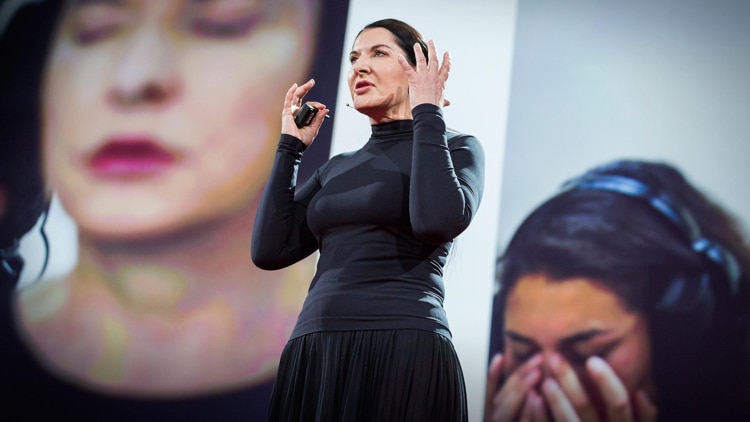
Performance artist Marina Abramovic giving her TED Talk in March 2015. (Photo: TED )
Held annually since 1990, TED Talks have become a go-to source for those looking to learn and be inspired. Creative TED Talks have become a staple of the conferences, with world-renowned artists, photographers, authors, and creative thinkers sharing the secrets of their success.
By showcasing their ideas in 18 minutes or less, the most interesting TED Talk speakers are pushed to open up and let us into their processes. Who wouldn't want to know what makes performance artist Marina Abramović tick or what motivates war photographer James Nachtwey to put his life on the line in the name of photojournalism ?
These TED Talks are also an incredible way to get new ideas on the creative process and learn how you can change your mentality to get inspired and invigorated. By seeing how others are using their art to create positive change in the world, one can't help be pushed into action.
With this in mind, we've curated our list of the 30 best TED Talks about art, inspiration, and creativity. Whether you're an artist yourself or simply interested in the creative world, you won't want to miss these thought-provoking talks.
Best TED Talks On Creativity and Imagination
Next: watch more ted talks on how art can spark positive change., get our weekly newsletter, learn from top artists.

Related Articles

Sponsored Content
More on my modern met.

My Modern Met
Celebrating creativity and promoting a positive culture by spotlighting the best sides of humanity—from the lighthearted and fun to the thought-provoking and enlightening.
- Photography
- Architecture
- Environment
6 TED Talks That Will Boost Your Creativity

“Creativity is always a leap of faith,” author Julia Cameron said. “You’re faced with a blank page, a blank easel or an empty stage.” It’s all part of the process when you live a creative life or work in a creative field, but some days the blankness gets the better of you. You can’t seem to write the first word, paint the first mark or speak the first line.
Before you get too down on yourself, check out these inspiring TED Talks to help you find a creative (pun intended) solution to your creativity problem.
1. Shimpei Takahashi: ‘Mute your inner critic’
[ted id=2208]
It’s easy to stop yourself short when you’re in a creative mindset, shooting down ideas before they have a chance to fully form. That’s why Shimpei Takahashi, a toy developer from Japan, uses a brainstorming game he calls “Shiritori,” where you simply list words, each beginning with the letter that the previous word ends with. Once you have a list, you challenge yourself to come up with ideas connected to each of those words. (If I’m at a cafe brainstorming article ideas, I might start with listing “Coffee > Elephants > Socks,” and then that list might become “When To Drink Coffee To Be Most Productive,” “Tricks for Never Forgetting Someone’s Name,” and “What To Wear For An Evening Networking Event.”) Not all of the ideas will be great, he says, but that’s not the point; with that understanding, you can retrain your brain to be less afraid of self-censoring and have more total ideas from which to choose.
Read more: 3 Ways to Instantly Be More Productive
2. Elizabeth Gilbert: ‘Turn down the pressure’
[ted id=453]
Elizabeth Gilbert, the author of Eat, Pray, Love , wants to squash the idea that you have to suffer to be creative. “Creative genius,” she says, is inside of all of us, and our creativity can—and perhaps, should—be separated from our sense of self. She argues that, once you start just showing up and waiting for creativity to come to you, it will. Sometimes more slowly than at other times, but it will. Listen to this talk when you need to be reminder that, all current roadblocks aside, you will create again.
3. Matt Ridley: ‘Start mating your ideas’
[ted id=915]
Ideas are great, but ideas borne of multiple other good ideas are even better. Author Matt Ridley talks about the inventions, movements and other discoveries that have most changed humanity—and how they were all the results of the combination of the best parts of other ideas. If you’re looking for inspiration, try mashing up the best features of two great ideas you’ve already had to create something entirely new.
4. Tim Harford: ‘Reframe obstacles as opportunities’
[ted id=2401]
The story that Tim Harford presents at the start of this talk is a lesson in the power of perseverance and improvisation that every creative type needs to hear at some point—or at many points. Flaws, challenges, mistakes and other unexpected obstacles force us to slow down and to think differently, which often results in better outcomes. So the next time you’re struggling with an “impossible” deadline or a “ridiculous” limitation, give this talk a play and reframe the challenge as an opportunity to create some of the best work you’ve done to date.
Read more: Maria Shriver On The Power of Conversation
5. Tim Brown: ‘Have a little fun’
[ted id=392]
Fear of judgment is often what causes us to be conservative, to censor ourselves and to be embarrassed about what we create. But it turns out, children don’t self-edit in that way; they’re focused more on possibility than judgement. To get back into that childlike mindset, designer Tim Brown encourages play. This talk comes packing some seriously fun tips and activities to help abandon self-censoring.
6. Ann Morgan: ‘Diversify your portfolio’
[ted id=2382]
It’s easy to fall into the same old habits and find yourself struggling to create anything new. But sometimes, a lack of creative output comes as a result of a lack of new inputs. When Ann Morgan found her bookshelf lacking in diversity, she set out on a mission to read a book from every country, exposing her to new voices, perspectives and stories. “Books have an extraordinary power to take you out of yourself and into someone else’s mindset so that, for a while at least, you look at the world through different eyes,” she says. Head to your nearest bookstore and pick up something outside your normal genre to see if it stirs up something new.
When you’re feeling creatively off, the instinct is to keep pushing forward on the same path, with greater force. But sometimes, by making a simple shift in your perspective, your process or your experiences, you can adjust your mindset just enough for something to click into place.
More Must-Reads from TIME
- Welcome to the Noah Lyles Olympics
- Melinda French Gates Is Going It Alone
- What to Do if You Can’t Afford Your Medications
- How to Buy Groceries Without Breaking the Bank
- Sienna Miller Is the Reason to Watch Horizon
- Why So Many Bitcoin Mining Companies Are Pivoting to AI
- The 15 Best Movies to Watch on a Plane
- Want Weekly Recs on What to Watch, Read, and More? Sign Up for Worth Your Time
Contact us at [email protected]
Your Article Library
Speech on creativity: definition, process and other details.
ADVERTISEMENTS:
Speech on Creativity: Definition, Process and Other Details !
What is creativity?
Creativity is the act of creating something new.
It is the ability to develop new ideas and discover new ways of looking at problems and opportunities.Joseph A. Schumpeter (1934) was the first to point out the importance of creating new things which Schumpeter calls ‘innovation’, by entrepreneurs.
According to Schumpeter, there are five forms of innovation that entrepreneurs can introduce in their enterprises:
(i) New method of production,
(ii) New source of supply of raw material,
(iii) New market,
(iv) New combination of factors of production, and
(v) New form of business.
In a sense, creativity is adding value and creates new-twists to things to enhance or enrich peoples’ lives. Here is one such example of creativity. In her training class, Linda Turner came up with an idea for practical lingerie for pregnant women. “I was watching a woman who was hugely pregnant holding up her belly and thought, “There must be something out there to help her”.
Hours of research, interviews with hundreds of pregnant women, and a patient search turned up nothing, and Turner knew she had a business in the making. She needed a prototype, so she bought a jog bra and a heavy girdle and sewed them together to make the first Bellybra. “It was one of the most ridiculous things I’d ever seen,” she recalls, “but it worked.”
A pregnant friend tested Turner’s crude prototype and gave it a rave review. Turner applied for a patent and in 1991 licensed her new product idea to Basic Comfort, a small baby products business looking for new ideas. In 2000, Turner and Basic Comfort terminated their licensing agreement, and Turner formed T & J Designs, LLC with partner Cindy Koch to make the doctor recommended Bellybra.
Like many innovators. Turner created a successful business by taking two everyday items that have existed for many years and combining them in a different way. Like Bellybra, there are number of new twists, or say, modifications made to the existing products adding value to these. To name, modifications, or say, new twists to steam engine to electric engine and push button telephone to dial number telephone are such examples of creativity.
Creativity emanates from imaginative ideas. Transformation of imagination becomes creativity. The transformation of Jeff Bezos’s imaginative thinking of World Wide Web (www) to use in retailing (Amazon.com) is the best example of creativity.
Why creativity in entrepreneurship?
The simple answer to this question is creativity serves as one of the most important tenets of entrepreneurship. In today’s fiercely competitive, fast-paced global economy, creativity is not only an important source of building a competitive advantage, but it also is a necessity for survival. Today’s highly complex and uncertain business environment demands the entrepreneur to go beyond merely using the past happenings for developing creative solutions to the modern business problems.
This is because history is not always repeated more especially in the fast changing business environment. Therefore, history is not a reliable predictor of the future in business. Hence, creativity has become the hallmark of entrepreneurship.
Sometimes, the three terms, namely, creativity, invention, and innovation are considered as synonym. But, each means different meanings. As mentioned little earlier , creativity is the ability of creating something new often imaginative thinking and skills.
Invention is the act of creating by exercise of the imagination which lot is previously known to exist. Innovation is the process of doing new things. The Harvard University Professor Theodore Levitt (1986) opines that creativity is thinking new things and innovation is doing new things.
In short, entrepreneurs survive and succeed by thinking and doing new things or old things in new ways. While creativity is the seed of entrepreneurship, innovation is the process of entrepreneurship. Thus, creativity is a prerequisite to innovation.
The Creative Thinking Process :
Can creativity be taught or learnt? The answer to this question is in affirmative. For many years, the conventional wisdom held that a person was either creative or not. But, today research has shown that any person can learn, through techniques and behaviour, to become creative.
There is research evidence to believe that ideas sprout out of a process. To quote, Isaac Newton may have been hit on his head by a falling apple, but he discovered the ‘Gravity Theory’ through a lifetime of scientific investigation.
Thus, this establishes that ideas usually evolve through a creative process involving certain stages. Though various stages have been listed in the creative process, but most social scientists agree on five stages labeled as idea germination, preparation, incubation, illumination, and verification.
These are diagrammatically depicted in the following Figure 10.3.

Now, the five stages of creative process are discussed one by one:
Idea Germination:
The idea germination stage is just like a seeding process. But, it is not like planting seed to grow com. Instead, it is like natural seeding wherein the pollinated seeds, for example, of flowers scattered over land by wind find fertile ground to take root. Though it is well-nigh impossible to know exactly how an idea is germinated, the source of most creative ideas can be traced to an individual’s interest in or curiosity about the specific problem or thing. Let it be clarified with a real anecdote.
Alexander Graham Bell’s Creativity: The Hearing Aid:
Alexander Graham Bell had been fascinated with the physics of sound since childhood. He was influenced to study human hearing systems by his mother, who had a serious hearing problem. As a young adult, Bell taught at a school for the deaf and hearing-impaired, and he set up a laboratory for testing new hearing devices.
Bell experimented for several years with magnetic devices in an effort to produce ‘hearing aid.’ Bell’s idea for a hearing aid was evidently seeded years before he invented the telephone, and it evolved through his interest in helping others.
Preparation:
Once the seed of curiosity is sown, creative people start nurturing and developing it through exercises and experiments. In our above anecdote, Alexander Graham Bell made several experiments with magnetic devices in an attempt to develop his idea of hearing aid. Similarly, if it is an idea of launching a new product, the preparation involved in developing the idea is to conduct the market survey and research.
Incubation:
Just a hen hatches egg to create pig, the germinated idea also needs to be incubated to create the ultimate idea. Though individuals sometimes concentrate intensively on an idea, but more often than not, they simply allow ideas to grow without any intension and efforts. It is something like “sleeping over” the idea and not thinks about it.
The belief is that sometimes some creative and innovative ideas come to mind when you are not actually thinking about them, i.e. a kind of result of thinking by the “unconscious mind”. Different methods like reading a book can be used to incubate ideas. However, incubation timing and duration may vary from person to person.
Illumination:
Illumination is the penultimate stage in creativity and occurs when the breakthrough is achieved as a result of preparation and incubation. This is the moment when the individual finds that he has found a unique solution to his/her problem. The fable of the thunderbolt is captured in this moment of illumination.
When the individual can say, “Oh, I see!” It is a kind of “eureka” state that brings excitement where the person finds what he liked for and which was deluding him previously. Reaching the illumination stage separates day-dreamers and tinkers from creative people who find a way to transmute value.
Verification:
Verification, the fifth and last stage, is the development stage of refining knowledge into application. An illuminated idea still has no or little meaning until verified as useful. This is a tedious and critical stage because while verifying the utility of ideas, many ideas may fall by the way side as they prove to be unrealistic and to have no or little value. Therefore, the usefulness of every created idea needs to be duly verified before putting it to commercial use. In nutshell, development of creativity follows a quirky nature of process.
Creative Mind :
Research has shown that the human brain has two distinct hemispheres which process information differently. One, the right hemisphere, is the creative side where spatial relationships developed and intuition prevails.
The other, the left hemisphere, is the analytical side. Psychologists report that most people tend to have one side dominant over the other. The left-brain is guided by linear vertical thinking (from one logical conclusion to the next), whereas the right brain relies on kaleidoscopic, lateral thinking (considering a problem from all sides and jumping into it at different points).
The both hemispheres together with their attributes are presented in Table 10.5:
Table 10.5: Attributes of Left and Right Hemispheres:
|
|
|
| Conscious (Aware and focused on Specific problem) Rational (Conscious modeling of issues linearity) Analytical (Use of knowledge to evaluate issues) Logical (Deductive reasoning to establish relationship) | Unconscious (Unaware and unfocused on specific problem) Non-rational (Spatial imaging without direction) Intuitive (Use of experience and emotions to evaluate issues) Synthesizing (Illogical reasoning and fantasizing) |
From an entrepreneurial perspective, the right-brain attributes lie at the heart of creative process.
Those with a dominant orientation to the right side are prone to creative behaviour and tend to:
a. Ask the question “Is there a better way?”
b. Question and Challenge custom, routine, and tradition.
c. Realize that there may be more than one “right answer”.
d. See mistakes and failures a mere “pit stops” on the way to success.
e. See problems and obstacles as springboards for new ideas.
f. Have “helicopter skills” to see an issue from a broader perspective and then swooping back down to focus on an area in need of change.
Barriers to Creativity :
We have just mentioned that the right-hemisphere of human mind is prone to creative behaviour. Before this, we also mentioned that, through techniques and teachings, anyone can learn to be creative.
But, we have only a few creative, or say, entrepreneurs among us. This is because of barriers to creativity. The major barriers to creativity are those that individuals impose on themselves.
a. Searching for the one “right” answer…
b. Constantly being practical.
c. Fear of committing mistakes and failing.
d. Fearing looking foolish.
e. Avoiding ambiguity.
f. Inability to incubate.
g. Lack of challenge and confidence.
h. Believing that “I am not creative”.
The above “mental locks” become logjams to creativity. Hence, those logjams or blocks need to be removed and avoided to enhance creativity.
Related Articles:
- Managing Individual Creativity in an Organisations
- Need for Innovation and Creativity for an Organization
No comments yet.
Leave a reply click here to cancel reply..
You must be logged in to post a comment.

35 Speeches on Creativity
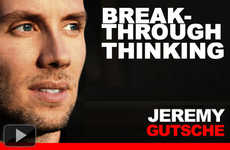
From Creativity-Enabling Spaces to building Creative Confidence

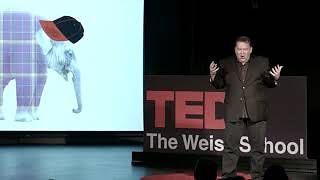
TED is supported by ads and partners 00:00
What If?: From Inspiration to Innovation
- entertainment

30 Famous and Short Inspirational Speeches (5 minutes or less)
- December 13, 2023
This post is all about the best short inspirational speeches.

If you are in need of a quick boost of inspiration and motivation, you will find that in this post. I am one of those people who loves to get motivated. That sounds weird, right?
Well, a lot of people these days tend to give motivation a hard time because they don’t believe that it has lasting effects. In other words, they believe that what’s most important is your own self-discipline, because that’s what you have to rely on when motivation isn’t there.
And while I do agree with that sentiment in general, I will never pass up a great motivational podcast or YouTube video! 😀 There’s just something about them that even if they might not have lasting effects, they do truly help pump me up in the moment to get work done. And that’s usually what matters to me the most when I am looking for them in the first place.
So, here are the very best short motivational speeches so you can get that quick fix of motivation that you’re looking for, and ultimately move closer to your goals and dreams.
Short Inspirational Speeches
Believe in yourself speeches.
If you lack confidence or you are doubting yourself, these short motivational speeches will help you to believe in yourself again.
1. Rocky’s Inspirational Speech to His Son | ROCKY BALBOA
In less than 5 minutes, you’ll watch Rocky Balboa (Sylvester Stallone) explain to his son that if he wants to have the life he desires, he needs to believe in himself. He needs to stop listening to the people that tell him who he is, and instead go be his own person, and stop looking for someone to blame when things aren’t working out for him because ultimately it’s on HIM. This is one of the greatest inspirational speeches of all time.
2. Find Your Purpose | David Goggins – Motivational Speech
David Goggins is truly incredible. A former Navy SEAL, he has broken records and ran more races than you’d imagine. But the one thing that really stands out about him is his mindset.
Listen to this video if you want to be great. He tells you exactly what you need to do to get there.
Also, if you’ve never read David Goggins’ book “Can’t Hurt Me” , I highly recommend it. He talks about his rough upbringing, and how he was able to essentially become an entirely new person to become a Navy SEAL.
3. BELIEVE IN YOURSELF – Motivational Video (ft. Jaret Grossman & Eric Thomas)
This video is all about how important it is to have the proper belief system. If you truly believe that you are one of the best, you will start acting that you are one of the best, and eventually you may just be one of the best.
4. DON’T LET YOUR DREAMS DIE – Motivational Speech
This YouTube short by Mel Robbins is so good, I had to share it. A light bulb went on in my head when I first watched this. If there is something that is always on your mind, don’t let it haunt you forever because you never put yourself out there to try it. Go and DO!
Motivational Speeches About Not Giving Up
The following short motivational speeches are all about not giving up on your dreams. If you are losing hope, these short motivational speeches will inspire you to keep going.
5. Brené Brown It’s Not The Critic Who Counts
This speech will give you chills, and it is packed with great lessons about life. Brené Brown is a researcher who went viral for a Ted Talk, and here she talks about how to overcome critics and to keep believing in yourself no matter what. If you are worried about what people think of you, you NEED to watch this.
6. Amazing Motivational Speech by Denzel Washington
This is another video that gave me chills. The main theme of this famous speech is “ease is a greater threat to progress than hardship”. Stay consistent even when it’s hard. Easy task after easy task won’t get you to where you want to be.
7. Steve Harvey – Inspirational Speech | Motivational Short Video | Incredible You
This short motivational speech by Steve Harvey is short but impactful. If you are someone who stepped out of your comfort zone to pursue something really difficult, and you’re thinking about giving up, this speech may just prevent you from doing so.
8. Ed Mylett on The Power of One More
Ed Mylett shares the story of how his father stayed sober until his dying day, and how Ed himself uses that same philosophy to never give up. Personal stories like these are always the most inspiring.
By the way, if you REALLY want to push yourself and become the best, read Ed Mylett’s most recent book on this same topic, “The Power Of One More” .
Motivational Speeches If You’re Feeling Behind
Are you feeling behind in life? If so, let’s change that. Watch these videos to be reminded that you are on your own unique path. You have no competition other than your past self. These short motivational videos will help you believe that.
9. Before You Feel Pressure – WATCH THIS | by Jay Shetty
Jay Shetty talks to a school class about how there’s no one “perfect” life timeline to follow, and that we are all on our own clock.
10. Kevin Hart Motivational Speech
If you’ve made mistakes in your life (haven’t we all) this is a great story from Kevin Hart (famous comedian and actor) that will remind you of the power of making mistakes and pushing through hard times.
11. Oprah Winfrey | 5 Minutes For The NEXT 50 Years of Your LIFE
In this video, Oprah talks about the importance of really knowing who you are and what you want in your life. She talks about surrounding yourself with great people, and how to have enormous success. “Let excellence be your brand.”
Listen To These If You Need Perspective
Sometimes in life, we get so caught up in the day to day that we forget what truly matters – the people we love. If you are having trouble with something in life, give these videos a listen, because they just might help you realize what is really important.
12. Arnold Schwarzenegger – Organize Your Day | 1 MINUTE MOTIVATIONAL VIDEO
Are you the kind of person who always complains that you don’t have enough time to do something? If so, you’re not alone. We are all busy humans, running around doing a million things. But if you aren’t prioritizing what you know you should be doing, listen to this video.
13. How to Judge Your Life Using 3 Simple Questions | Brendon Burchard Speech| Goalcast
Have you ever heard of Mortality Motivation? It’s essentially what it sounds like… being motivated by the impending reality of your death. It sounds a little morbid, but it’s actually quite beautiful and it can be really beneficial if you harness it for good.
In this video by motivational speaker Brendon Burchard, he shares how a car accident when he was 19 gave him mortality motivation and changed everything for him.
14. FALL, SUFFER AND LEARN | MOTIVATIONAL SPEECH BY OPRAH WINFREY
This speech by Oprah was given to Harvard graduates, and it’s a unique speech because she talks about failing, even after the major success of her television show for over 20 years.
It’s refreshing to hear that even the most successful people fail. What really matters, though, is what you do with your failure. Do you learn from it and move on? Or do you give up?
15. YOU VS YOU – Best Motivational Video
This is a pretty intense video about competition. If your #1 competition is someone else, you need to change your perspective. Your only competition is YOU. The only thing preventing you from moving forward is you.
16. The Speech That Brought This Entire School To Tears
This is a speech about a man who never really paid much attention to his mother, until she passed away. It’s an emotional reminder to cherish the time you have with your loved ones, because you never know if the next time you see them will be the last time.
In my opinion, this speaker embodies many qualities of the best motivational speakers because he really knows how to capture the audience’s attention and pull on their heart strings.
17. 5 Minutes to Start Your Day Right! – MORNING MOTIVATION
This motivational speech is by a Navy SEAL who will remind you to start each day with a task completed, respect everyone, take risks, step up during tough times, and never give up. If you do these things, the next generation, and the generations that follow, will live better lives than we live today.
18. The Real You – Jim Carrey
This video is one of the best motivational speech examples because it reminds you of something so important: sometimes we can be so focused on earning more money, gaining fame, and becoming admired that we lose ourselves or we lose sight of what’s really important to us in the process.
Jim Carrey talks about how he is a great example of that. He got all of the money, fame, and admiration, and admits that that wasn’t really who he was. Sometimes it’s nice to be reminded that money and fame, or even getting to the top of the corporate ladder, while nice, aren’t going to be the thing that brings you fulfillment when it’s all said and done.
19. Ed Mylett Motivational Speech
I posted another motivational video by Ed Mylett above, but if you don’t know much about him, prepare to have your world rocked. He’s probably my absolute favorite motivational speaker because he is successful and he works hard, but he’s also (seemingly) a kind, family guy who’s been through a few things.
In this video, he talks about being “the one” that changed his family tree. Take a listen because I’m sure it’ll get you thinking on whether or not you can be “the one” in YOUR family.
P.S. If you love personal growth content, you should check out Ed Mylett’s podcast . I listen to it every week and it is one of my favorites.
20. If You Feel LOST, LAZY & UNMOTIVATED In Life, WATCH THIS! | Tony Robbins Motivation
If you are someone who is constantly blaming others or your circumstances for your unhappiness, you need to listen to this video by Tony Robbins . Bad things happen to us all, it’s up to you to focus on what you can control.
Great Inspirational Speeches About Hard Work
How hard do you think you work? Could you be doing more? If there’s a little voice inside of your heart that knows you could be doing more and better, these motivational videos about the value of hard work will help you push yourself.
And a side note: your chances of having good luck increase the harder and longer you work.
21. You’re Not Tired, You’re Just Weak – David Goggins Motivation
If you’re feeling lazy or like you don’t want to do something, watch this video til 2:25 . It will give you the push you need to put your head down and do the work. It’ll remind you to keep pursuing your goals and to keep challenging yourself. Key takeaway: push yourself beyond your perceived limits.
22. Hard Work & Patience – A Gary Vaynerchuk Original Film
If you want to be motivated to work hard, listen to Gary Vaynerchuk. Gary Vaynerchuk is a creative genius known for his marketing tactics. This famous motivational speech is all about playing “the long game”, as in, working for a long time and having patience instead of working hard for a short period of time and expecting to win quickly.
23. OBSESSION – Best Motivational Speech
This is one of my favorite short motivational speeches because it makes me feel a little more normal for being “weird”. I’m the kind of person who chooses to work on the weekends instead of hanging out with people. Crazy, right? But it’s because I’m working toward a dream of mine and it’s something that’s really important to me. The most important thing to remember: it’s okay to devote yourself to something. It’s the only way to get what you want in life.
24. WORK LIKE HELL – Best Motivational Video
This is a series of motivational speeches about doing a little bit more and outworking your competition. I’m not going to lie – I’m up late writing this post and listening to this very video is what’s motivating me to keep going.
25. The video EVERY woman should watch!
Whether or not you’re a Rachel Hollis fan may be up for debate (and that’s okay!) but I happen to think she’s a great motivational speaker. This entire speech will inspire you to work hard and take massive action – today.
26. NEVER SURRENDER – Powerful Motivational Speech (by Kobe Bryant)
This one minute video by the late Kobe Bryant is one of the most famous short speeches. I read a book recently by his former personal trainer and I learned that Kobe really outworked everyone. He talks about a quote in this video that really stuck with him, and I think it’s great advice if you’re the kind of person who needs motivation to keep working hard.
Motivational Speeches About Working Smart
Have you ever heard the saying “work smarter, not harder”? That saying is all about ensuring that the work you are doing is actually efficient. Are you getting to where you want to go with all of the work that you are putting in? Are you getting closer to your goals and your dreams? Or are you sprinting like a hamster on a wheel and just running in circles?
Here are great videos on the importance of working hard but also working intentionally.
27. SET SYSTEMS RATHER THAN GOALS – Motivational Speech – James Clear
A goal gives you a sense of direction, but if you don’t spell out precisely how you are going to get to a goal, it is useless. You must develop systems. Listen to this James Clear video to gain valuable life lessons.
By the way, James Clear is an author who wrote perhaps my favorite book of all time: “Atomic Habits” . It’s life-changing if you haven’t read it yet.
28. Matthew McConaughey | 5 Minutes for the NEXT 50 Years of Your LIFE
This is one of the best motivational speeches of all time about how to live a great life for YOU. It’s filled with little pieces of wisdom that’ll really get you thinking about how you live your life and in what direction you want to go.
29. Visualization is the key – Bob Proctor
Do you believe in the Law of Attraction? If not, I have to say I’m surprised! I’ve experienced it in my own life more than once, and it is incredibly powerful. Here’s a great video that sums up the power of visualization, and if you want to learn more about the Law of Attraction or manifestation in general, read this post .
This video shows the true power of words, thoughts, and feelings that you have.
30. How to Stay Motivated – Carla Harris
Here is a YouTube short with very practical advice from Carla Harris on HOW to stay motivated. It’s all about having a vision!
This post was all about short inspirational speeches. Which one was your favorite?
Related Posts

The 12 Best Law of Attraction Apps for Manifestation

25 Inspiring Quotes: Do Something Today For Future You

A Candid Convo About Imperfection with Schmooze with Suze
Join the imperfect taylor newsletter.
Stay in the know! Every week you’ll receive new blog posts that help you on your personal development journey – from mindset & money to health & career – no topic’s off limits.

About Taylor
A few years after graduating college, Taylor made it her mission to become debt free. After paying off all $60k of debt, she began to blog about what she's really passionate about: personal development. Nowadays, Taylor blogs about the topics of Mindset, Money, Health, and Career for women. Read more about Taylor here.

"It's Per$onal" is a super popular and anonymous blog series about the personal lives and finances of women all over the world. Check it out!

If you like this post, you might like these, too!

100 Funny Work Affirmations For A Positive Day

120 Powerful Buddhist Quotes That’ll Change Your Life
- Advertising
- Art & Culture
- Graphic Design
- Illustration
Photography
- Product Design
- Inspiration
- Get Featured
- X (formerly Twitter)
40 of the best inspirational and motivational talks for creatives
Success is 10% inspiration, 90% perspiration. But without that all-important 10%, there’d be nothing to sweat over.

Image licensed via Adobe Stock
Regularly topping up the inspiration levels is excellent for focus, energy levels and all-round work happiness. So enjoy Creative Boom's collection of some of the most motivating and informative free video content around. Warning: watching these videos may result in a serious surge of get-up-and-go.
Art and Innovation
1. stan lee / advice for comic book writers and other artists.
Straight-talking comic book storyteller extraordinaire shares his thoughts on influence, authenticity and structure. If you’re working with your imagination, can you afford not to listen to the guy who invented Spiderman, Iron Man , the X-Men and Daredevil ?
Watch the Video
2. Eight Artists / Advice to the Young
Visual artists Olafur Eliasson, the Chapman Brothers and William Kentridge all have strong feelings on what it takes to ‘make it,’ and present a diverse selection of insights to inspire young artists to do big things. Other sage advice comes from Serbian performance artist Marina Abramovich, German film director Wim Wenders, punk poet Patti Smith, and Talking Heads frontman David Byrne, who advises: “Never undervalue your artistic satisfaction”.
3. Neil Gaiman / Make good art
Prolific horror writer Neil Gaiman discusses how, upon starting on a career in the arts, having no idea what you’re doing is a wonderful and powerful thing. Especially when he says: “The rules of what’s possible and impossible have been made by people who never tested the boundaries - and you can”.

4. Magnus Walker / Go with your gut feeling
Motivating TED speech from an ordinary Northern lad whose journey took him from being on the dole in Sheffield to stumbling into owning a fashion house in LA. A tale about engineering your luck, taking your chances and adapting quickly whenever an opportunity arises.
5. Paul Klein / How to succeed as an artist
A 40-min lecture on how to make a relationship with your art that you are comfortable with - and how to make the most of it. Very inspiring, especially when he points out, “creatives have better access to problem-solving, and can make the world a better place if they are sufficiently empowered”.
6. Laura Hollick / You are the Art
Artist and shaman Laura Hollick gives a deeply emotive talk. To truly create from the soul, an artist must find a bridge between their inner selves and the outer world. Her epiphany started with creating an art piece that majored on a debilitating chronic skin condition she suffered in her youth.
Digital and Design
7. joe gebbia - founder of airbnb / executing your idea starts with a single small step.
The catalyst for Airbnb was an unaffordable rent demand, which meant rookie entrepreneur Joe Gebbia needed to find the cash fast. Along with his housemate, they threw together a quick website to rent out an airbed in their living room, and the rest is even more interesting.
8. David McCandless /The Beauty of Data Visualisation
There is a huge amount of data out there, at unprecedented levels and climbing. Journalist David McCandless talks about his passion for data detective work, and how the only way for the brain to make full sense of it all is to showcase information in pictorial form. His findings are inspiring, shocking, amusing, and at times, irritating.
9. 50 entrepreneurs share priceless advice
An 18-minute video with a torrent of inspiring tidbits from the people behind game-changing digital businesses such as Amazon, Apple, Spotify, Google, Paypal, LinkedIn and many, many more. Eighteen minutes well spent!
10. Alexis Ohanian of Reddit / Making something people love
One hour lecture from the co-founder of Reddit.com explaining how entrepreneurs must pay close attention to the community, connection and design - and how to go on the offensive when you’ve got your creative ducks in a row. Wonderfully informative and energising presenter, who preaches: “Only your mom wants to use your website – every other user has to be earned”.
11. Janine Benyus / 12 sustainable design ideas from nature
Biomimicry is beautiful. For example, a locust's ability to avoid touching other locusts within a fast-flying swarm tells us how to design a crash-resistant car. The best creative director in the world is nature. Imagine designing and orchestrating springtime. Janine Benyus talks us through some of the finest innovations inspired by nature - and how to come up with even more.
12. Law Alsobrook /Graphic design and the making of meaning
Where art tries to reveal the world of the artist, graphic design tries to help others with their world. Ergo, design can save the world, only without heroics or pyrotechnics. Virginia Commonwealth University in Qatar's university professor Law Alsobrook talks us through how graphic design is the best job in the entire world, and how it’s the closest modern job to alchemy.
13. Inspiring Words from Eminem
From being constantly underestimated by his peers, to multi-platinum selling artist in the world - and according to many prominent scholars - the most important poet in the last hundred years. Here Marshall talks about dealing with the death of his best friend, stacking creative ammo and putting his daughter first. Spend five minutes with Marshall Mathers, and I defy you not to come out fighting – “I feel like anybody can do anything they set their mind to. It depends how bad you want it.”
14. Bruno Mars
A rousing speech by hitmaker Bruno Mars on dealing with haters and doubters in a world where everyone’s a critic. This interview with Ellen De Generes gets going at 4:50, where Bruno gets passionate and goes direct to camera.
15. Nile Rodgers
A 10-minute talk-cum-guitar lesson from Chic disco legend and the creative brain behind an enormous catalogue of hit records. Talking in soft tones that belie his electrifying presence, he tells us trade secrets about his signature guitar style and how to write songs.
The Nile lets us in on this gem: “It’s not what you play; it’s what you don’t play that makes it funky…” Watch the video; you’ll see straight away what he means.
16. Andrew Stanton / The clues to a great story
Andrew Stanton wrote and directed Bugs Life, Finding Nemo and Wall-E . He is currently busy directing Finding Dory and writing Toy Story 4 . He knows a thing or two about stories, and he conveys these insights brilliantly. A wonderful TED Talk from a truly inspirational creative leader.
17. Richard Curtis BAFTA Screen Writers Lecture
Brilliant tips piece from the celebrated British writer and director who gave us Notting Hill, Four Weddings and a Funeral and About Time . Richard talks a little about his work and a lot about how to get out of blocked up moments, i.e. how to unstick when you’re stuck. You couldn’t buy such treasured tutelage.
18. Robert McKee / Big Think Interview
A one-hour talk from screenwriting guru and author of the seminal text on storytelling for the movies. The focus is good old-fashioned form and technique - McKee often comes across as bullish and dismissive of others work - but only when that work relies exclusively on special effects, with scant regard for a story. You will become a better storyteller for watching this video, whether you’re a filmmaker or not.
19. Nicolas Forzy / Making your first film: whatever it takes
Burnt-out city boy turned independent filmmaker delivering a killer TED talk on how you don’t need money to make a film. You have to work out how to get stuff for free, and do it yourself, even the stunts.
20. Steven Spielberg
Steven Spielberg offers an uplifting 12-minute commencement address about his first cinema experiences, and changing his major at university to accommodate him being “one more victim of this tremendous drug called cinema”. In his words, “Your meaning and purpose in life only whisper to you, it rarely shouts”.
21. JJ Abrahams /The Mystery Box
Lost, Star Trek and Star War VII director JJ Abrahams talks about his twin obsessions: mysteries and deconstructing things (right the way down to Kleenex boxes). Great presenter, highly motivating, with a strong comic edge. JJ talks amusingly about the challenges of writing, casting and shooting the pilot of Lost in 11 weeks with plenty of jokey asides, including being inspired by and slightly in awe of technology.
22. Dewitt Jones
National Geographic photographer and author of nine books explains the principles behind coming up with an extraordinary vision. He talks with persuasive eloquence about the metaphors for finding the perfect photograph being the lessons for a creative life - and life in general.
23. Art Wolf / The art of the image
Amazing guide on how a top photographer pulls something out of an everyday scene that 99% of the population would never see. Art Wolfe records wildlife, landscapes and native cultures; his mastery of colour, composition and perspective have brought him internationally acclaim - so if you have photographic ambitions, you’d be a fool not to listen to him.
24. Karen Hutton / Finding your soul's genius & voice in your photography
Find your voice isn’t just for writers and poets. Karen Hutton talks about putting your whole self into your art and developing ‘signatures’ intrinsic to your work, in the hope that when people see a picture, they instantly recognise it as one of yours. Watch the Video
25. Vincent Versace / The lens is the brush
Versace is a pioneer of the art and science of digital photography, and his work has led to innovative breakthroughs across the whole digital image value chain. The full enigmatic title of this talk is: “The lens is the brush, the camera is the canvas, the file is the sheet music, and the print is the symphony”. The focus is much more technical than many photography talks, which is hardly surprising, due to Vincent’s position as both creative and technical leader.
26. Jeff Cable / How to photograph events and make money doing it
Over the last six years, Jeff Cable has developed a unique approach when shooting weddings, Bar Mitzvahs, and other events, and now his side project has become a second full-time job. Here he shares information on how you can take your hobby and make it pay. Watch the Video
Game Design
27. an inspirational story of a paralysed video game designer.
A truly inspirational story of one man’s barnstorming comeback from a freak accident. After initially thinking his career was over, Jon Hales started his own games studio and codes with the knuckle of his pinky finger. Heroic stuff.
28. Will Wright / Game design from the creator of The Sims
The architect of the Sims shows how to build structure, narrative, motivation and challenges into a game’s dynamics. A very long talk but super-interesting throughout.
29. Daniel Cook / Game design theory I wish I had known when I started
Veteran games designer, and co-owner of developer Spry Fox, Daniel Cook talks us through a selection of abstract design tools that makes creating great games come easier. These include loops, arcs, internal economies, and interaction frequencies - all essentials to inventing a highly addictive game.
30. Google Talk / Three game design mistakes you're making
Google ‘Development Advocate’ Todd Kerpelman has designed his fair share of successful games, but it’s the flops he learned most from. Here he shares the three biggest mistakes that game designers make, because, he says, ‘chances are, you're making them, too.’
31. Jonathan Blow: Video games and the human condition
Indie game developer Jonathan Blow on taking video games design beyond box-ticking of best practices and into experiences that connect and engage on a much deeper human level.
Creativity Leadership and Learning
32. where good ideas come from.
A four-minute delightfully animated video discussing the value of the ‘slow-burning hunch’ and what environmental conditions are required to turn these hunches into full-blown killer ideas.
33. Julian Treasure / How to speak, so people want to listen
The voice is the instrument we all play. It’s the most powerful sound in the world, both how wars are started and how we tell people we love them. Although the instrument is so powerful, many people struggle with playing it well. Julian Treasure talks through the seven deadly sins of speaking, and a model of good positive speech that people won’t want to ignore.
34. The science of persuasion
11-minute animated video backed up by 60 years of research on the scientific factors in getting someone to say YES…You will be surprised by the findings.
35. Dr Ivan Joseph / The skill of self-confidence
Self-confidence is a skill. It can be defined as the ability to believe that you can accomplish any task, no matter what the adversity. As it is a skill, self-confidence can be learned. Here Dr Ivan Joseph, Athletic Director and head coach of the Varsity Soccer team at Ryerson University, shows you how to convince yourself: “I am the captain of my ship and the master of my destiny”.
36. How to finish your business plan in one day
Growthink has helped over 500,000 entrepreneurs start, build or exit their company. Here they present a 22-minute guide to completing a business plan in 1/10 of the time it would take most people. Tackles the three main stumbling blocks of festering business plan motivations: lack of time, not knowing what to write, and being clueless on the financials.
37. Josh Kaufman / The first 20 hours: how to learn anything
Josh specialises in teaching people from all walks of life how to master practical knowledge and skills. In this talk, he shares how having his first child inspired him to approach learning in a whole new way. The talk takes 9 minutes to get going, but when it does, the four simple steps to rapid skill acquisition could help make learning new skills less intimidating.
38. Idriz Zogaj / How to Become a Memory Master
With a better memory, you can be a better leader and quicker-thinking creative. Presented by the five-time winner of ‘Sweden’s Best Memory’, this TED talk will tell you learnable techniques to give you supreme memory power and at the same time, provide the ancillary benefit of more in-depth insight into the inner workings of your beautiful brain.
39. Simon Sinek - Love Your Work
Sinek's amazingly simple idea, The Golden Circle, is grounded in the biology of human decision-making and is changing how leaders and companies think and act.
40. Jim Carrey’s Secret of Life
Jim Carrey gives an erudite, moving address on the key to living a fulfilling life. Just three minutes, he’ll take, to melt your heart: “Life doesn’t happen to you; it happens for you.”
Editor's Picks

What successful creatives wish they'd known when they were fresh-faced graduates

Why Amber Asay's new podcast on women in design is a must-listen

Why brand portals are the future of brand building

The Quentin Blake Centre for Illustration has just found its perfect home

Benidorm's Golden Years: Jack Kenyon captures the resort's overlooked greying couples
Take the creative boom survey.

Illustrator Sam Taylor on his psychedelic kids' book inspired by the band Phish

Great Ormond Street Hospital Charity unveils its refreshed brand identity

How to become more confident as a creative

The best new typefaces for June from leading foundries and designers

Penguin Books reveals the winners of its 2024 Cover Design Award

Part memoir, part manual: Matt Owens offers contemporary advice on running a creative business

Embracing Fun: The fuel for creative sparks, with Richard Speight, Jr.

The art of giving a f**k, with Kelly Korzun

Lines & Legacy: Exploring the creative process amidst industry shifts, with Christoph Niemann

Branding brilliance and crafting iconic identities at Koto, with G Torto
Further reading.

10 of the best CRM software tools for small business owners
](https://www.creativeboom.com/upload/articles/a9/a9a3a5c565cd1cfd2b42bdaf85df2223d4ca37c1_732.jpeg)
10 of the best project management tools for small business owners

Five of the best cash flow management tools for small business
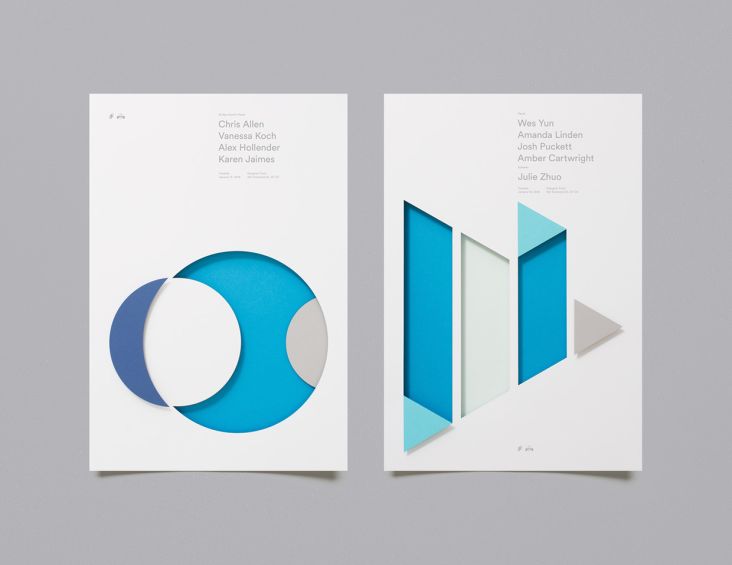
Moniker uses paper to create tactile, abstract posters for Designer Fund

Looking Down on Munich: A fascinating bird's eye view of a German city

How to write about your authentic self without feeling as though you’re showing off
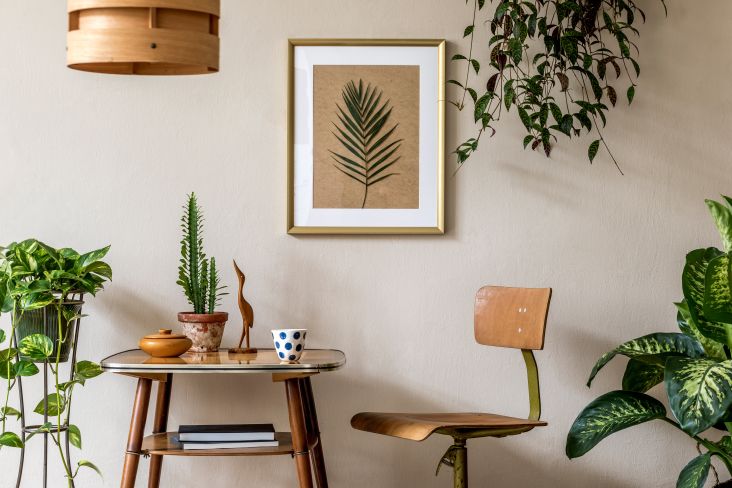
Lessons in happiness: The surprisingly simple things that help you lead a happy life

20 free or affordable tools to help money-saving freelancers run a lean business
Get the best of Creative Boom delivered to your inbox weekly

Finally, A Commencement Speech About Innovation and Creativity
Think Big Anyway! That’s what Innovation Excellence contributor Robert B. Tucker advised students when he delivered the commencement address at the University of California, Davis. Given the exponential rate of change and the inability to predict where technology (and their careers) will evolve to, Tucker challenged this group of 500 PhD candidates and innovators to “Think Big, Anyway,†despite the uncertainty. Robert explored three “success ingredients,” which he called the 3’Cs, for those just starting out in their careers: the necessity to Embrace Change; the importance of Unleashing Creativity; and the need muster the Courage to “create the life you really want to live.â€
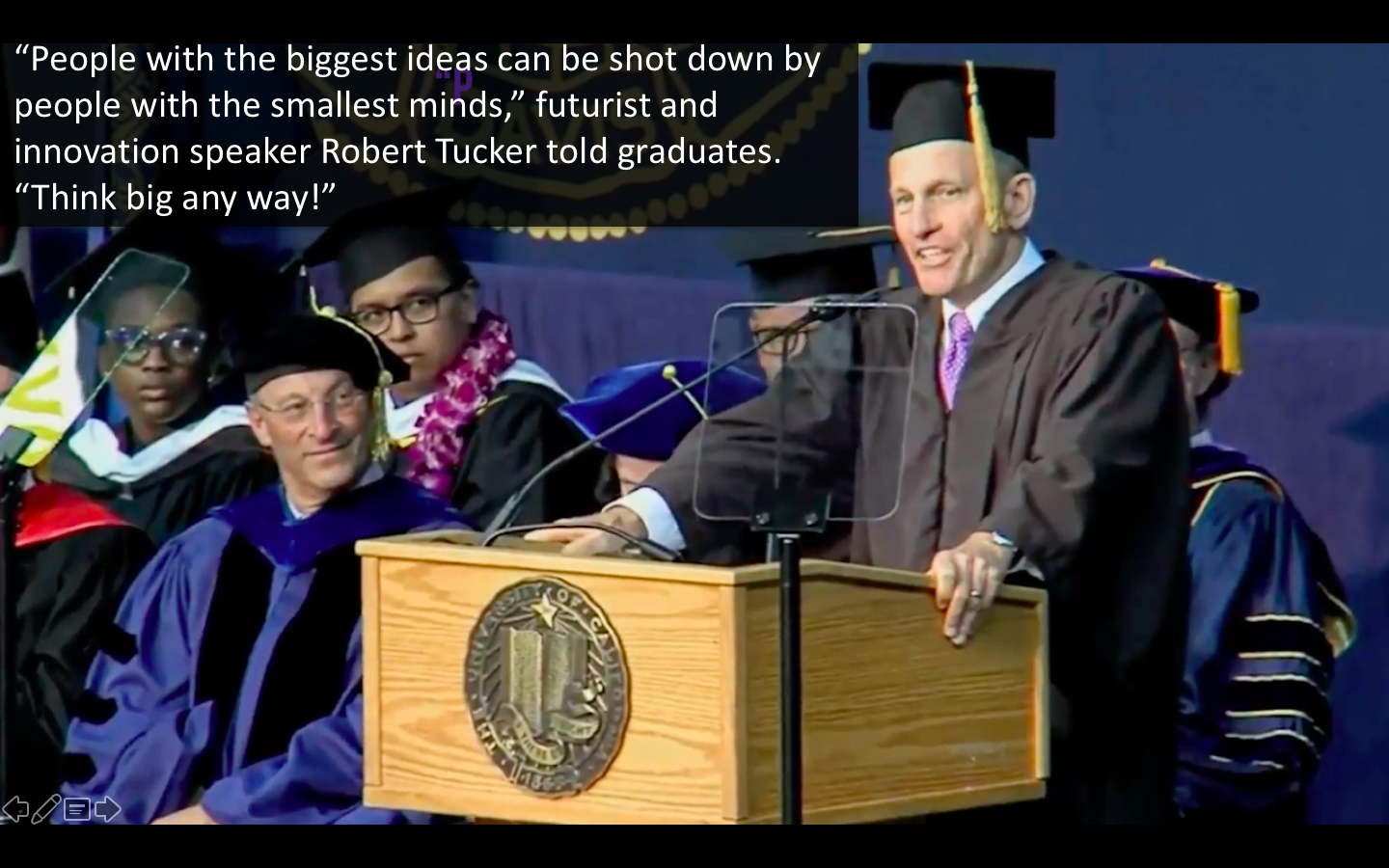
“IBM did a study not long ago,” Tucker reported, “where they asked CEOs “what leadership competency do you need more than any other in people todayâ€? And the answer was creativity. They called creativity the single most important leadership competency in a world that is more volatile, more uncertain, and more complex than ever before.†You in your journey are going to face situations where there are no guidebooks, where GPS is simply not available; where there are few precedents to rely on, where you will just need to improvise, trust your instincts; and make it up on the spot. But if you’re willing to embrace your creativity, you’re going to be just fine. In fact, you’ll be in high demand, whatever you do.
“Nothing about the future is written in stone. My generation, The Boomers, came of age during the time of Vietnam and Watergate and social unrest. We tried to stop a war and create a better world, and we are not done yet. But now your generation has your chance at bat. Your chance to make a difference. Your chance to change the world. And that’s my encouragement to you – to think big when others are thinking small. To push back against those who say that the best days are behind us, that our problems have grown too big. And just remember this. People with the biggest ideas will always be ridiculed by people with the smallest minds. But so what! Think big anyway! And do good not only for yourself, but for others, and for the planet. The good you do today may be forgotten tomorrow; do good anyway. Build a life, not just a resume.â€
Check out the video of Robert’s commencement speech:
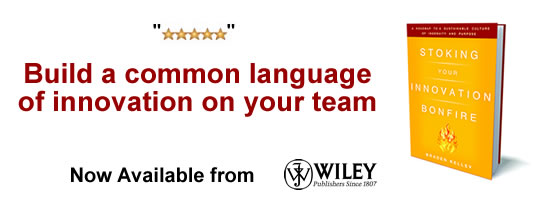
Wait! Before you go…
Choose how you want the latest innovation content delivered to you:
- Daily — RSS Feed — Email — Twitter — Facebook — Linkedin Today
- Weekly — Email Newsletter — Free Magazine — Linkedin Group

Innovation Excellence
Never miss another newsletter.
Thanks for subscribing! Please check your email for further instructions.
LATEST BLOGS

Three things you didn’t know about credit cards
Photo by Ales Nesetril on Unsplash Many of us use credit cards regularly. From using them for everyday purchases to…
Five CV skills of a business-minded individual
Photo by Scott Graham on Unsplash The skills listed on a CV help employers quickly understand your suitability for a…
- Next »
Leave a Comment Cancel Reply
Save my name, email, and website in this browser for the next time I comment.


IMAGES
VIDEO
COMMENTS
Speech on Creativity. Creativity, the spark that lights up your mind with new ideas, is a magical process. It's your unique way of expressing thoughts and emotions. You might find creativity in painting a picture, writing a story, or even solving a tricky math problem. It's your special touch that makes something ordinary, extraordinary.
The best commencement speeches transcend the limitations of the genre to provide inspiration for all of us. Below, read 10 great commencement speeches by writers and artists on how to live with more creativity and courage. Bill Watterson, Kenyon College 1990. With all due respect to John Stuart Mill, maybe utilitarianism is overrated.
3 science-based strategies to increase your creativity. These three unexpected things can help fuel your creativity: A good mood, some quiet time that's all your own, and limits. Learn why, from performance expert Steven Kotler. Posted Jan 2021. See all articles on Creativity.
It gets you through good times and it gets you through the other ones. Life is sometimes hard. Things go wrong, in life and in love and in business and in friendship and in health and in all the other ways that life can go wrong. And when things get tough, this is what you should do. Make good art. I'm serious.
Yet surely, David Kelley suggests, creativity is not the domain of only a chosen few. Telling stories from his legendary design career and his own life, he offers ways to build the confidence to create. (From The Design Studio session at TED2012, guest-curated by Chee Pearlman and David Rockwell.) 15:15.
This speech was originally delivered to Video Arts in 1991. 1. ... Now creativity can happen, because play is possible when we are separate from everyday life. ... Thanks for reading. You can get more actionable ideas in my popular email newsletter. Each week, I share 3 short ideas from me, 2 quotes from others, and 1 question to think about.
One is the extraordinary evidence of human creativity in all of the presentations that we've had and in all of the people here. Just the variety of it and the range of it. The second is that it's put us in a place where we have no idea what's going to happen, in terms of the future. No idea how this may play out.
In her speech Millie discusses the importance of finding a balance between creativity and the academics. Individuality and mental health are more valuable than our grades and we should not seek social acceptance or academic success if we find it uncomfortable to do so. Through anecotes, Millie introduces the audience to her own experiences and how she has been able to overcome times of hardship.
Visit http://TED.com to get our entire library of TED Talks, transcripts, translations, personalized talk recommendations and more.Reflecting on moments that...
Often, the speakers at these conferences are people from a creative background, and through their short speeches, you can learn how to tap the creativity in you. When rounding up these talks, we decided not to go for creativity talks about passion and inspiration. We wanted to focus on practicality — something which doesn't just inspire you ...
Summary. Creativity isn't inherent. You have to hone it. Here are a few ways to do that, based on neuroscience. Engage with nature: Looking at trees and leaves, instead of our electronic devices ...
30 of the Best TED Talks to Inspire Creativity. Performance artist Marina Abramovic giving her TED Talk in March 2015. (Photo: TED) Held annually since 1990, TED Talks have become a go-to source for those looking to learn and be inspired. Creative TED Talks have become a staple of the conferences, with world-renowned artists, photographers ...
She argues that, once you start just showing up and waiting for creativity to come to you, it will. Sometimes more slowly than at other times, but it will. Listen to this talk when you need to be ...
Become more creative by understanding what ideas are and by realizing what is stopping us from becoming as creative as we can be.Learn about how creativity i...
The Harvard University Professor Theodore Levitt (1986) opines that creativity is thinking new things and innovation is doing new things. In short, entrepreneurs survive and succeed by thinking and doing new things or old things in new ways. While creativity is the seed of entrepreneurship, innovation is the process of entrepreneurship.
These speeches on creativity offer useful tips and strategies for individuals in various industries to reach their full creative potential. Spotlighting a number of well-known people like Elizabeth Gilbert and Isaac Mizrahi, these speeches discuss everything from developing a creative concept to the necessary conditions for getting into the right creative mindset.
In this video, you'll learn more about creativity. Visit https://edu.gcfglobal.org/en/creativity/ for additional information.This video includes information ...
Watch next. If we do things the way they have always been done, nothing changes. In this inspirational speech, Mr. Harmeyer reminds us that creativity and innovation are linked, and true innovation happens only when we ask "what if?"
The best commencement speeches transcend the limitations of the genre to provide inspiration for all of us. Below, read 10 great commencement speeches by writers and artists on how to live with more creativity and courage. Bill Watterson, Kenyon College 1990. With all due respect to John Stuart Mill, maybe utilitarianism is overrated.
This is one of the greatest inspirational speeches of all time. 2. Find Your Purpose | David Goggins - Motivational Speech. David Goggins is truly incredible. A former Navy SEAL, he has broken records and ran more races than you'd imagine. But the one thing that really stands out about him is his mindset.
4. Magnus Walker / Go with your gut feeling. Motivating TED speech from an ordinary Northern lad whose journey took him from being on the dole in Sheffield to stumbling into owning a fashion house in LA. A tale about engineering your luck, taking your chances and adapting quickly whenever an opportunity arises.
He has appeared on PBS, Bloomberg, CBS News, and was a featured expert on the CNBC series The Business of Innovation, hosted by Maria Bartiromo. Details: www.innovationresource.com or contact (805) 682-1012. Posted in Change, Creativity, Feature Of The Week, Innovation, Video.